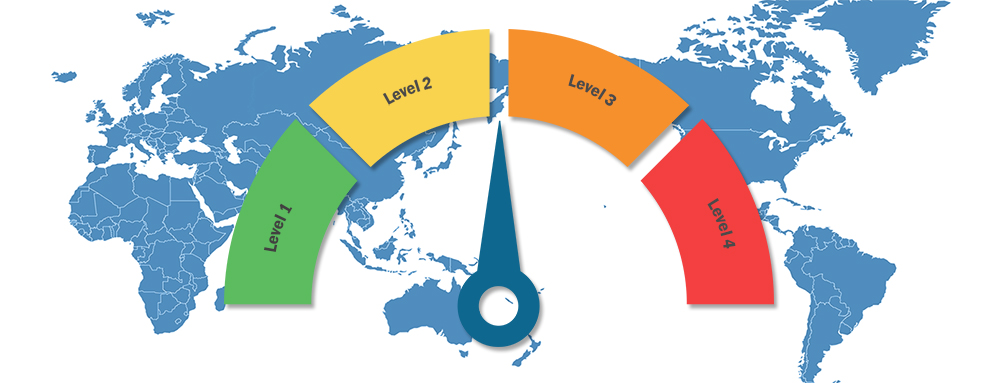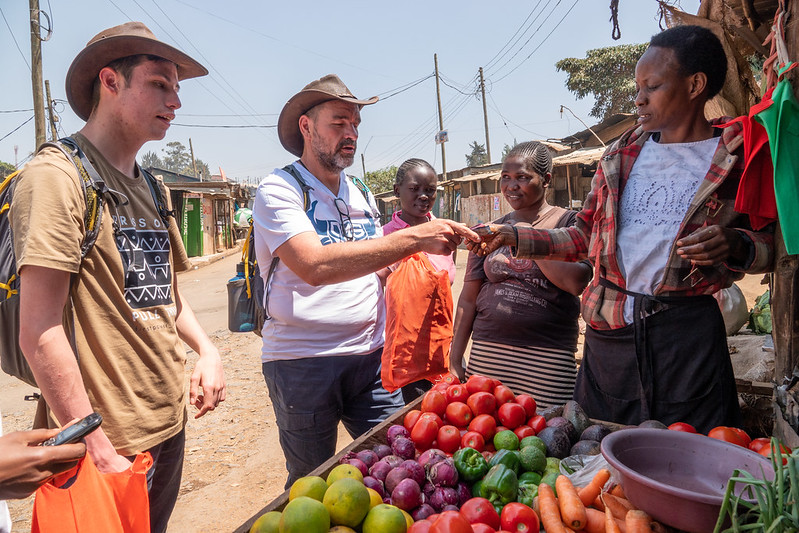East Africa is a major tourism hotspot. It’s estimated that the region welcomed more than six million tourists in 2019. With a wide variety of beautiful scenery, unforgettable adventure experiences and diverse cultures, visitors from across the world are drawn to the explore the off-the-beaten-track adventures offered in the East African region. Before planning your East African adventure, it is important to understand the risks involved with travelling in the specific country you want to visit. One of the best ways to do this is to visit the Australian Government Smartraveller website - https://www.smartraveller.gov.au.
Smart Traveller risk categories
Here is a summary of the four risk categories used by Smart Traveller (note, wording coppied exactly from Smart Traveller to avoid confusion):
| Level 1 | Exercise normal safety precautions | "Use common sense and look out for suspicious behaviour, as you would in Australia" |
| Level 2 | Exercise a high degree of caution |
"Pay close attention to your personal security and the current health situation. Monitor the media for new and existing risks. At level 2, there are more or higher risks than what you would typically find in a large Australian city. We're not saying 'don't go' to this location. But you should do your research and take extra precautions". |
| Level 3 | Reconsider your need to travel | "Avoid non-essential travel. Do your research and check that your insurer will cover you". |
| Level 4 | Do not travel | "If you're already in this location, you should consider leaving if it's safe to do so". |
For more detailed definitiions, please refer to https://www.smartraveller.gov.au/consular-services/travel-advice-explained.

Picture from https://www.smartraveller.gov.au/consular-services/travel-advice-explained
Risk breakdown by country
The first thing you should do is know the countries that make up East Africa. A great way to remember the 'main' East African tourist countries is by remembering the acronym TUSKER, which is, interestingly, also a type of beer you can buy in Kenya!
| Country | Smart Traveller rating (Feb 2023) | |
| Tanzania | Exercise a high degree of caution (level 2) |
|
| Uganda | Exercise a high degree of caution (level 2) |
|
| Somalia | Do not travel (level 4). |
|
| Kenya | Exercise a high degree of caution (level 2) |
|
| Ethiopia | Reconsider your need to travel (level 3) |
|
| Rwanda | Exercise normal safety precautions (level 1) |
|
Other countries in East Africa that tourists also visit include: Malawi (level 2), Zambia (level 1), Zimbabwe (level 2), Mozambique (level 2), Democratic Republic of the Congo (Level 3).

Key risks to be aware of in the region
In addition to the risks outlined by the Australian Government, we have identified a few risks that you should be aware of when planning your adventure. From our experience travelling in this area since 2008, most East Africans love and respect tourists. We've often seen them going out of their way to make sure you have an unforgettable and safe experience.
Petty crime
According to the Australian Government, petty theft and threats of violence are common in Tanzania, especially in Dar es Salaam. Bag & phone snatching from moving vehicles is increasing and you should not resist. To mitigate this risk, you are recommended to leave non-essential valuables in Australia, leave essential valuables in your hotel or out of sight in your pocket/bag, and purchase adacquate travel insurance.
Road Safety
Road safety should be a priority for anyone travelling through Africa. Road accidents are common due to bad roads and poor driving. Across the continent, it’s estimated that 15% of deaths are caused by road accidents. Some simple things that you can do to stay safe on East Africa’s roads:
- Pay attention to and know the road signs
- Wear your seatbelt at all times
- Know which side of the road vehicles will drive on (e.g. look left in Uganda and right in Rwanda)
- Regardless of which way you think traffic should be moving, always look both ways as drivers often drive on the wrong side of the road
- Know the road rules
- Only travel with reputable taxi, bus and safari companies
- Avoid travelling at night
COVID-19
COVID-19 remains a risk around the world, including in East Africa. We recommend you stay up to date by monitoring local media. In some countries and in remote areas, remember that medical facilities may be limited, and if you get sick, you may need to be evacuated to a larger city or even a different country. Check your travel insurance to ensure medical and evacuation is covered, and make sure you bring appropriate protective items such as masks, hand sanitiser and even hand soap if you’re going to be in a remote location.
Most East African countries will require you are fully vaccinated to enter, or present a negative COVID test. Refer to Smart Traveller for requirements for each country.
Malaria
Malaria is a risk across most of East Africa. We recommend you talk to a travel doctor about taking anti-malaria medication. We also recommend you educate yourself on how to avoid being bitten (i.e. use insect repellent, cover up, etc).
Water
Tap water is not safe to drink in East Africa. Your tour operator should provide bottled and boiled water for the duration of your trip. If not, water is available for sale at most shops, but be aware that some sellers will refill bottles with tap water and reseal with glue to make higher profits. Please also be conscious of using single use plastic bottles. A few more environmentally friendly solution include:
- Buy 20L bottles of water that can be refilled. Once you are done with the bottle, give it to a local who can use it for water storage or collection. These bottles can also be used for building, gardening and a number of other innovative solutions to avoid throwing them in landfill.
- Buy a steri-pen or water filter.
- Buy sterilisation tablets.
Local rules and customs
Local customs and rules vary to Australia, and it is important to understand what is acceptable and what is not. Here are a few examples:
- Most of East Africa is conservative and it is important to wear clothing that covers your shoulders and knees, particularly if you are a female.
- Single use plastic bags are illegal in most countries and can incur a fine of up to US$40,000 or multiple years jail.
- The possession of pornography is illegal and may incur a fine or jail time.
- Homosexuality is illegal in many African countries. You should refer to the Australian Government advice for the country you are visiting for more details.
- Taking a local person’s picture can be offensive. Please always ask for permission.
- Taking pictures of military buildings or officers is a serious offence.
- Community justice is common and can be brutal. Before accusing someone of something, be aware of what the community may do to them.
- If you are in a car accident where someone is killed or seriously injured, you should immediately drive to the local police station for protection. Staying at the scene of the crime, particularly if you are at fault, may increase your risk of retaliation by the community or family.
- If you take someone to hospital, be aware that the medical system is not free. If they cannot afford treatment, you may be expected to pay. This should not be a barrier if someone needs urgent medical attention, just something for you to be aware of.
There are also many other unique rules and customs you should be aware of so make sure you do your research. If you are travelling with Adventure Out Loud, we will provide you with a list of things to be aware of before your adventure.
Travel insurance
Always purchase travel insurance before you book flights, accommodation or tours. It is important to make sure your policy will cover you for everything you want to do. A few things you should check your East African travel policy covers before you buy it:
- COVID: make sure your policy covers unlimited medical and evatuation for COVID related illnesses. Also ensure your policy covers cancellation costs relating to COVID.
- Kilimanjaro:
- You will need cover for camping & hiking without ropes and mountaineering gear up to 6,000m. Many policies exclude trekking over 3,000m
- Wildlife experiences (safari, gorillas, chimps, etc)
- Unlimited medical cover
- Unlimited evacuation cover
- Trip cancellation, delay and interruption cover (minimum equal to the total cost of your trip, including flights and other extras)
If you live in Australia and you want help purchasing travel insurance, please email our team on [email protected]
Before You Travel
East Africa offers so many unforgettable adventures. As expected, the area is under-developed and many countries have a weak law-and-order system and poor public services (i.e. hospitals, roads, police force, etc). These factors contribute to Smart Traveller classifying these countries as level 2. This should not deter you from visiting the region, and as stated on Smart Traveller about level 2 classifications, "we're not saying 'don't go' to this location. But you should do your research and take extra precautions".
Travel in East Africa is not as simple to plan from Australia as Europe, North America & South-East Asia. It can be hard to book accommodation and tours online, and local knowledge is extremely valuable. This is one of the major reasons why you should keep up to date with updates on the Smartraveller website, and always book with an experienced and trust-worthy tour company like Adventure Out Loud. We specialise in making exploring Africa easy, so you can have a hassle free adventure that you'll remember for the rest of your life.
Upcoming adventures
Ready to start planning your African adventure?
Check out our comprehensive guide to safari in Africa or our ultimate guide to trekking Mt Kilimanjaro, or book a free consultation with an African adventure expert to get started. Our private and custom-built luxury adventures are individually crafted to meet your wildest dreams! Secluded beach getaways, romantic safaris, honeymoon surprises, unique accommodation, or something a little weird and wonderful, tell us your wildest adventure dreams and we’ll make them a reality.